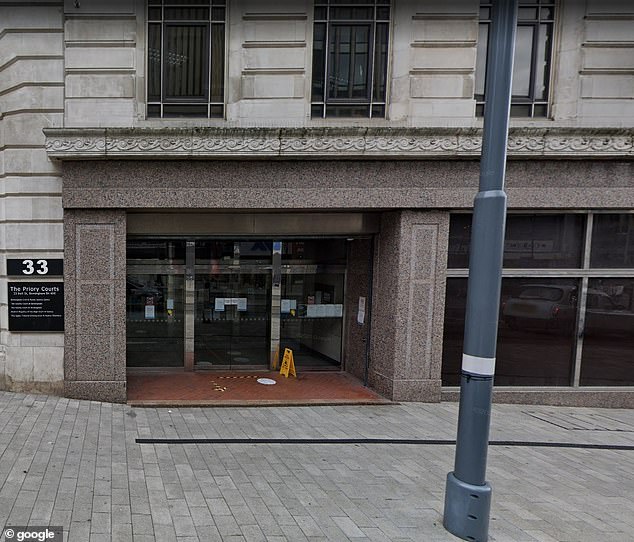A convicted Algerian criminal has been allowed to stay in Britain after claiming he would be mocked for wearing women’s clothes and makeup if he returned to Algeria.
The 27-year-old, who claims to be transgender, has been jailed for robbery and committed multiple offences including burglary, theft and battery since being granted refugee status in 2013.
In arguing against his deportation, the repeat offender, identified only as MS, claimed he would be targeted in Algeria because of his sexuality – described to a court as ‘gay, transvestite and/or transgender’.
And an asylum judge agreed, upholding his appeal against the Home Office‘s revocation of his refugee status.
Upper Tribunal Judge Christopher Hanson said: ‘Were MS to return to Algeria and be open about his sexuality, he would be at risk of mockery, harassment, discrimination and potential harm from non-state actors.
‘Were he to wear women’s clothes and makeup, he would certainly draw negative attention to himself, and would likely be subjected to ridicule, hostility and possible harm…
‘Algerian society would not generally accept men dressing as women or asserting that they are transgender.
‘Indeed, [his] account…of being ridiculed for wearing women’s clothes and make up in public areas is entirely plausible, as are his father’s threats to kill him on account of his behaviour.

A convicted Algerian criminal has been allowed to stay in Britain by an asylum judge at an Upper Tier Tribunal of the Asylum and Immigration Chamber, pictured, after claiming he would be mocked for wearing women’s clothes and makeup if he returned to Algeria
‘A family would deem such actions as deeply shameful and humiliating, and would do their utmost to prevent their son from bringing embarrassment and shame in this way.
‘If MS chooses to dress in women’s clothing or make up, this would heighten the threat of abuse.’
The Upper Tier Tribunal (UTT) of the Asylum and Immigration Chamber was told that MS is a gay man recognised as a refugee ‘who was and is a transvestite and/or is transgender’.
The hearing, held in Birmingham, was told that since arriving in Britain 12 years ago he had been convicted of numerous crimes.
‘Between April 2014 and January 2015, [MS] received four convictions for offences including: burglary and theft; attempted burglary with intent to steal; using threatening, abusive, insulting words or behaviour with intent to cause fear or provocation of violence; theft,’ the tribunal heard.
MS received a warning letter from officials in September 2015, after the decision was taken not to deport him due to Algeria’s ‘situation’.
He received eight further convictions between May 2016 and June 2018 for offences including ‘theft; resisting or obstructing a constable; failing to surrender to custody at appointed time and various driving offences’.
In August of the same year, he was convicted for offences including theft and ‘racially or religiously aggravated fear or provocation of violence in words or writing’.
He was again given a warning letter in September 2018 after a decision was made not to pursue deportation, and after further convictions between December 2018 and January 2019 he was given more warning letters.
In February 2019, he was issued ‘administrative removal papers as an overstayer’, following the expiry of his refugee limited leave to remain.
MS was in and out of prison after this point, and came to the attention of authorities in January of the following year after being convicted for offences including battery.
He was sentenced to four years and three months in prison after receiving a conviction for robbery and breaching a criminal behaviour order.
A deportation order was made in August 2022, and he was served with a notice of the decision to revoke his refugee status in the same month.
The Home Office asserted in July 2023 that the situation in Algeria had changed and that MS would no longer be an ‘individual who would face treatment amounting to persecution’ in the country.
However, a ‘country expert’ told the tribunal that while ‘homosexuality is not illegal in Algeria engaging in homosexual acts is a punishable offence’, and those who do not hide their sexuality are at risk of ‘physical violence’.
The Upper Tribunal heard that in interviews in May 2023, MS said: ‘He liked to play with girls and would dress up in his sister’s clothes for which his father would beat him.
‘His father would chain him to a wall and throw “rocks” at him.’
MS said that he had been raped as a child and had also been bullied in school for acting ‘like a girl’.
He said he feared for his life if he had to return to Algeria, where their father still lives.
The judge found that the asylum seeker ‘could well end up destitute and living on the streets’, and that ‘mental health problems would make him particularly vulnerable in this respect’.
Judge Hanson said: ‘I find a holistic assessment of the evidence shows there is sufficient to justify the maintaining of the grant of international protection.’
The judge found the first-tier tribunal made a legal error because it did not consider the ‘protected characteristics’ for which the asylum seeker has been ‘recognised as a refugee’.












